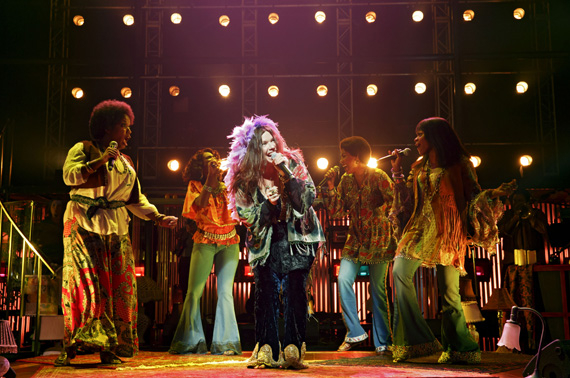A Night With Janis Joplin

(© Joan Marcus)
If freedom’s just another word for “nothing left to lose,” then the creators of A Night With Janis Joplin, making its Broadway debut at The Lyceum Theatre, obviously fear they have much to lose. There is little that feels free about this stiff musical of the dead-folks-in-concert variety. That’s not to say that the show’s star, Mary Bridget Davies, doesn’t turn in a rocking interpretation of Joplin’s songs: She does! Her voice is incredibly powerful, spot-on Joplin, and her supporting band re-creates the music flawlessly. But that alone does not make a great concert experience. There has to be an energy and stage presence around the music on top of that, and sadly, this confused and overlong tribute concert doesn’t have it.
As Davies points out, Janis Joplin was “a white chick singing the blues.” Born in Port Arthur, Texas, she became the lead singer of psychedelic acid-rock band Big Brother and the Holding Company at age 23. The raw power behind her gravelly voice, coupled with high-energy performances, skyrocketed her to fame and a promising career that was cut tragically short by her untimely death at age 27. Davies has big shoes to fill in this role, and in some respects, she succeeds.
The night starts out strong enough with the rollicking “Combination of the Two,” which leads right into the equally lively “Tell Mama.” If the creative team had left it at the music, this might have been a fine tribute concert. It’s the inter-song banter where this show runs into trouble: Writer and director Randy Johnson attempts to pay homage to a bevy of female blues performers who preceded and inspired Joplin: Bessie Smith (Taprena Michelle Augustine), Nina Simone (De’Adre Aziza), Etta James (Nikki Kimbrough). There’s even a divas-esque concert featuring Joplin and Aretha Franklin (Allison Blackwell). These women are undoubtedly great artists who all deserve their own bio-musicals. Their presence feels superfluous in this one.
I realize that Johnson is trying to show the continuity of American popular music — that Joplin stood on the shoulders of giants. With her wild hair and high-flying vocals, one could easily argue that she is the bridge between blues and the screaming hard-rock bands of the ’70s and ’80s (think Aerosmith and AC/DC). By opening all of these other doors, however, we are left with just the faintest notion of Joplin and her story, which is bizarre for a 135-minute show about her.
We do get to hear some awesome renditions of her songs, though, including “Piece of My Heart,” “Cry Baby,” and “Maybe.” Music director and lead guitarist Ross Seligman kills us with his heartfelt solo in “Stay With Me,” a real highlight.
When Davies sings, she projects a simultaneous vocal power and emotional vulnerability that is the sweet spot for this music. Yet when she starts talking, an immediate shield goes up and she becomes plastic Janis, a middling impersonation that offers little insight into the woman behind the voice: Davies curls her fingers and says thing like, “What I'm trying to do mostly, in the whole world, is to not bullsh*t myself, and not bullsh*t anybody else.” It’s hard to believe her when she keeps talking about Zelda and F. Scott Fitzgerald and not her own career. This creates a tonal dissonance: The content of the music feels completely divorced from the spirit of the event we are attending.
For instance, when you’re listening to the antiauthoritarian music of the ’60s, it really dampens the vibe to have a blazer-clad house manager yell at a couple of aging hippies to sit down and stop dancing. This is especially important for an artist like Joplin, who was disdainful of audiences that were overly cerebral and didn’t know how to “get down.”
That really goes to a larger issue with these concert musicals: If you’re going to stage a concert in a Broadway theater, you should expect a slightly different relationship between audience and performer than you would get with more traditional Broadway fare: That means more interaction and more spontaneity. You’re promising a concert experience. Isn’t it only natural that audiences should behave like they are at a concert?
Unfortunately, despite her considerable talent, Davies seems uncomfortable breaking out of the rigid script for this show and taking the risks that could make her a truly great concert performer. Similarly, the team behind A Night With Janis Joplin seems reluctant to take the steps that would make this show a uniquely memorable concert experience. An awesome set of pipes and some stock hippie costumes are not enough.











